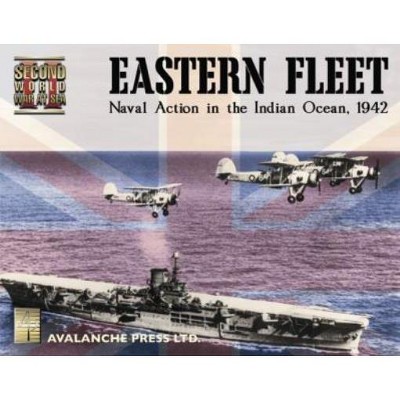Eastern Fleet (1st Edition, 2nd Printing) Board Game

Product info
Japan's daring plans to conquer Southeast Asia and its rich resources involved several stages. In the complicated fashion typical of the Imperial Navy during World War II, first the American Pacific Fleet would be knocked out of action at Pearl Harbor. Next, the carrier forces that had fought there would cover amphibious invasions in the Dutch East Indies and Malaya. Finally, the First Air Fleet's aircraft carriers would surge into the Indian Ocean to knock out the British Eastern Fleet. Eastern Fleet, the second game in the Second World War at Sea series, is based on this third stage of Japanese aggression and also covers parts of the second. There are 70 "long" playing pieces, depicting the major fleet units of both sides: battleships, aircraft carriers, cruisers and fleet destroyers. There are also 140 square playing pieces, half the size of the ship pieces, mostly depicting aircraft but also smaller warships and markers. The operational map depicts the eastern half of the Indian Ocean, including all the major ports and airbases of 1942. There, ships maneuver and fight using their gunnery and torpedo factors. Each player rolls a number of dice according to the ship's capabilities, hitting on a result of 6. Gunnery and torpedo damage tables give the results: ships can suffer damage to engines, hull or armament. Air attacks are resolved in similar fashion. The combat systems yield results rapidly but in a historically accurate fashion. There are eleven scenarios, or game situations, re-creating the battles and campaigns from the Indian Ocean. Three of these are "battle scenarios," useful for learning the combat system or for a quick game of 30 minutes or less. The other eight are operational scenarios. Players form their ships into fleets, and plot their movement across the operational map. When contact is made between fleets, play moves to the tactical map to resolve combat. The scenario instructions give each side a set of specific tasks that must be accomplished to win the game: launch amphibious invasions, escort troop convoys, bombard key enemy positions, or seek and destroy enemy fleets. These tasks are the same ones given to the admirals on the spot, usually Chuichi Nagumo for the Japanese and Sir James Somerville for the British. The scenarios give each player varied and difficult tasks. In Operational Scenario One, "Come In Rangoon," the Japanese must bring a convoy to southern Burma. They have six heavy cruisers to protect it. The British have an aircraft carrier, and a powerful battleship.Operational Scenario Two, "Andaman Invasion," has the Japanese invading the Andaman Islands chain in the middle of the map. They can cover this with one small aircraft carrier and their cruiser flotilla. The British have three aircraft carriers and five battleships. It's another matchup of strength against stealth. In Operational Scenario Three, "Raid on Ceylon." Six Japanese aircraft carriers and four battleships come to pound British installations. Operational Scenario Four is "Operation Number Eleven," the invasion of Ceylon that some Japanese leaders felt should have followed the carrier raid but never actually took place. In Operational Scenario Five, "Operation Stab," the British launch an amphibious invasion of the Andamans. Operational Scenario Six, "Operation Pamphlet," is a British convoy operation across the length of the map which the Japanese must stop. Operational Scenarios Seven and Eight are based on Winston Churchill's demands for American forces to bolster the British hold on South Asia. These require playing pieces from SOPAC, the first game in the series. The scenario book Distant Oceans adds more scenarios using Eastern Fleet with parts of other Second World War at Sea series game. 32"x22" strategic map 11"x17" tactical map 210 counters 12-page rulebook 12-page scenario book 2 player aid cards 1 organizational card
Price History
Price Archive shows prices from various stores, lets you see history and find the cheapest. There is no actual sale on the website. For all support, inquiry and suggestion messagescommunication@pricearchive.us